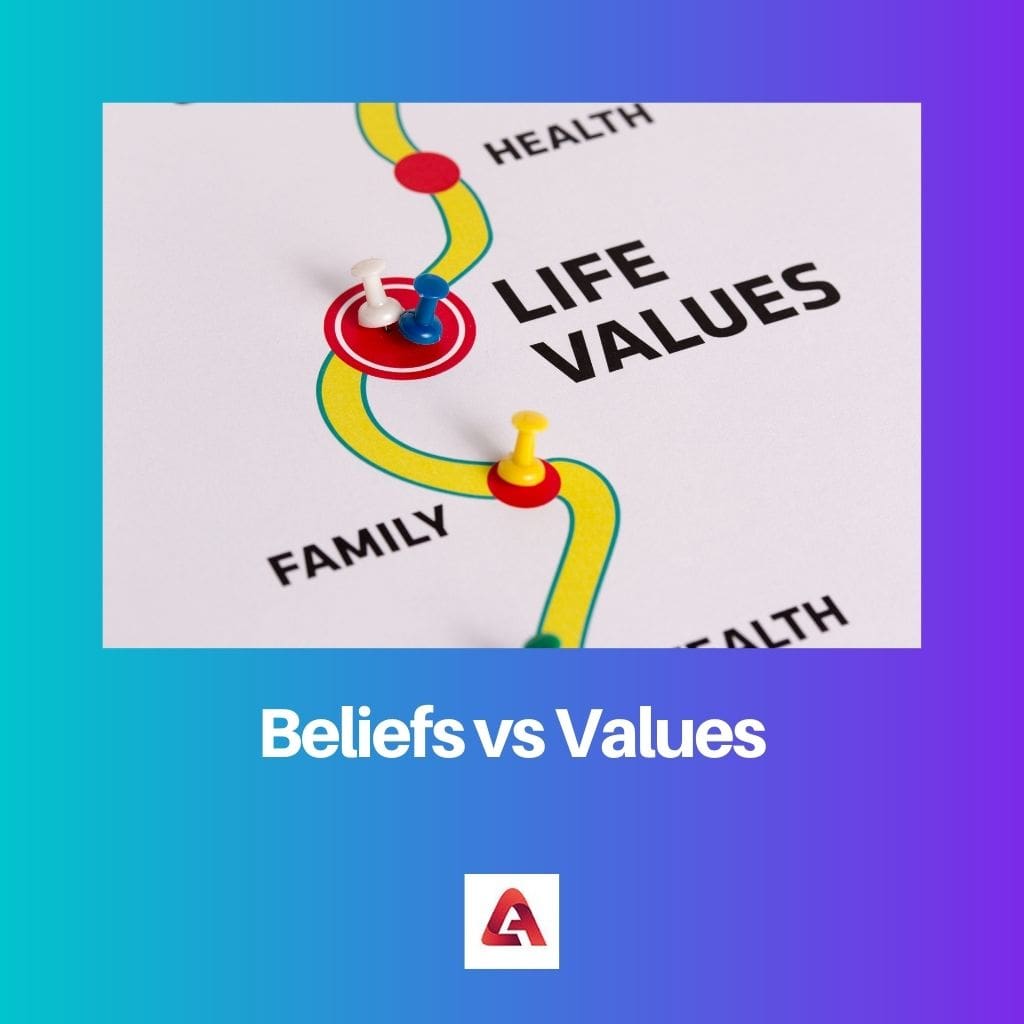Belief can be defined as a set of assumptions made about the surroundings. The word ‘belief’ originated from an old English word ‘, gelaefa’.
Value can be defined as worthy of a particular entity. The word ‘value’ is derived from the Latin word ‘valere’.
Key Takeaways
- Beliefs are convictions or accepted truths that individuals hold about the world, the universe, or themselves, based on personal experience, cultural norms, or faith.
- Values are principles or standards that individuals consider important and use to guide their behavior, decision-making, and actions.
- Both beliefs and values shape an individual’s outlook and actions, but beliefs are accepted truths, while values are guiding principles.
Beliefs vs Values
The difference between values and beliefs is based on their definition, the cause, the basis, the proof requirement and the factors it affects. Understanding the difference between values and beliefs is essential as they shape our personality and life.

Let us understand the word ‘belief’ through a sentence. For example, ‘religious texts are based on beliefs. This means that religious text is not proven data. People have beliefs that epics are accurate and that they need to follow.
Now let us understand the word ‘value’ in a sentence. For example, ‘feelings hold more value than money.
Belief has a vital role in the existence of a society. People with the same beliefs get along quickly.
The value defines the worth of any emotional or materialistic entity. Values are more complex than beliefs. Values grow from beliefs.
Since values are grown from beliefs, we need to understand the cause and origin of a belief. Belief is originated from what we hear, see or experience.
One can lead a prosperous and meaningful life with a better understanding of values and beliefs. One’s beliefs and values also affect the society one lives in.
Comparison Table
| Parameters of Comparison | Beliefs | Values |
|---|---|---|
| Definition | Set of assumptions made about the surroundings or world | It is defined as worthy of any entity |
| Cause | It originated from tales and experiences | It stems from beliefs; strong beliefs get converted into values |
| Basis | It is based merely on prejudice | It is based on the belief |
| Proof Requirement | It does not require any proof and explanation | It grows out of a belief and things we consider important |
| Effect | It always affects our morals | It affects our behaviour, character and personality |
| Example | The world is divided into religious beliefs. | Customer service can add value to the business. |
What is Belief?
Belief is an idea accepted as accurate without any facts or evidence. It varies from one society to another.
Most of the religious texts have no scientific or historical shreds of evidence. They are passed through tales, manuscripts, monuments and inscriptions.
Beliefs can be broadly classified based on their existence:
- Political Belief
- Religious Belief
- Social Belief
Belief can be religious or non-religious. Beliefs can be divided into two major categories based on religion.
- Monotheism
- Polytheism
According to the monotheistic belief system, there is only one God. A few religious sects follow monotheism.
- Islam
- Christianity
- Judaism
According to the polytheism belief system, there are multiple gods. People can believe in and follow any God.
- Hinduism
- Buddhism
- Taoism or Daoism
- Animism
- Confucianism
- Shinto
Not following any religious belief is classified as atheism. People following atheism are referred to as an atheist.

What is Value?
The value of an entity is the degree of importance it holds. The value of an entity is defined in terms of cash or importance.
The value of an entity decides its priority. Anything which is more valued is given a higher preference.
Values are beliefs that guide a believer’s action. Beliefs motivate physical and emotional action in the long term.
The value of an entity differs from consumer to consumer. There are four basic types of value.
- Functional Value
- Monetary Value
- Social Value
- Psychological Value

- https://books.google.com/books?hl=en&lr=&id=UVPMESnqY0AC&oi=fnd&pg=PR8&dq=Beliefs+and+Values&ots=2OPqrTOTcW&sig=lWtM4uQ6dEh0EJQqOm7E_fmqNkU
- https://www.uvm.edu/~dguber/POLS234/articles/feldman.pdf

An eye-opening read. The article confronts the complexities of beliefs in a diverse society.
The article succeeded in sparking meaningful discussions about the broader implications of beliefs and values.
Indeed, the intellectual rigor applied in this article is praiseworthy.
A remarkably insightful analysis of beliefs and values. The article is a valuable resource for anyone seeking to explore these concepts further.
The article makes a compelling case for the interconnectedness of beliefs and values and their influence on individuals and society.
Absolutely. This article significantly contributes to the discourse on the subject.
The article provides a comprehensive breakdown of beliefs and values, shedding light on the impact they have on our lives.
I appreciate the depth of analysis in this article. We need more discussions about these topics.
The article raises thought-provoking questions about the influence of beliefs and values in our society.
Indeed, it’s a significant contribution to fostering critical thinking and introspection.
I find it hard to believe that some people base their entire lives on unproven beliefs.
That’s a valid point. Society is heavily influenced by beliefs that lack evidence.
The comparison table is an excellent addition to this article. It helps to clarify the distinctions between beliefs and values.
I agree. The structured format of this article is very effective.
While beliefs are deeply ingrained in culture, values play a crucial role in driving human behavior.
Absolutely. This article has broadened my understanding of the complexities of beliefs and values.
An article that presents complex concepts with clarity. The in-depth exploration of beliefs and values is commendable.
Agreed. This article is a testament to the depth of understanding of the author.
I’m impressed by the depth of knowledge demonstrated in this article. It’s intellectually stimulating.
Very informative article. Understanding the fundamental differences between beliefs and values is essential for personal growth.
I couldn’t agree more. This article provided a clear and concise explanation of beliefs and values.
I’ve learned so much from reading this article. It’s thought-provoking and insightful.